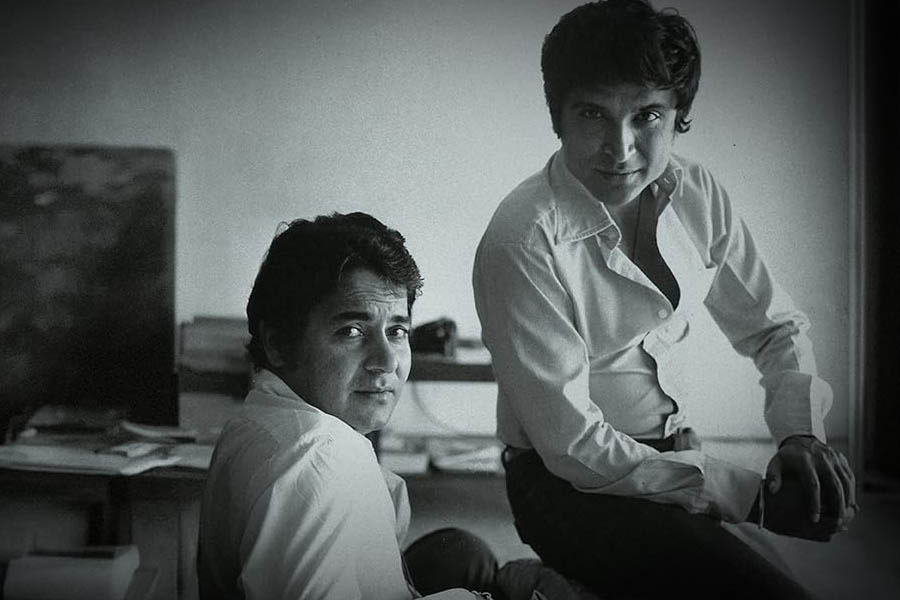Streaming on Amazon Prime Video, Angry Young Men: The Salim-Javed Story is more than a typical documentary. With three episodes, director Namrata Rao makes it an immersive journey into the golden age of Hindi cinema by taking a close look at the lives and careers of Salim Khan and Javed Akhtar, the iconic screenwriting duo who revolutionised Bollywood storytelling in the 1970s.
The series is co-produced by the children of Salim and Javed — Salman Khan Productions and Zoya Akhtar-Reema Kagti’s Tiger Baby along with Excel Media Entertainment — and unlike many retrospective documentaries, it doesn’t gloss over the trials that marked the careers of these legends.
The enduring impact of Salim-Javed
From the outset, Angry Young Men sets a powerful tone with a clip from Sholay (1975) where Gabbar Singh menacingly asks, ‘Kitne aadmi thay?’ The response, ‘Sirf do, sardar’, is followed by the title credit: ‘Written by Salim-Javed.’ This introduction ushers viewers into the Salim-Javed partnership that spanned 24 films.
Making her directorial debut, Namrata Rao brings the same meticulous attention to detail that has defined her career as an editor. The format of the series is similar to the Smriti Mundhra-directed docu-series The Romantics but its focus is sharper. While the interviews with film directors, actors and family members add context, the real stars are Salim Khan and Javed Akhtar themselves. Now 88 and 79 years old, respectively, they look back at their journey with a sense of subdued pride and some degree of detachment.
Birth of the ‘angry young man’
A central theme in Angry Young Men is the archetype of the ‘angry young man’, a character masterfully crafted by Salim-Javed and vividly portrayed by Amitabh Bachchan in film after film. The documentary posits that this archetype was born out of the writer duo’s personal experiences.
Salim Khan and Javed Akhtar, hailing from different parts of India, arrived in Mumbai in the 1960s with the dream to make it big in the film industry. Khan aimed to be a leading man but found himself relegated to minor roles; Akhtar was hoping to direct films while working as an assistant director. Their fateful meeting happened on a film set in 1969, setting in motion one of Indian cinema’s most successful writing collaborations.
Angry Young Men explores the challenges they faced when, too proud to ask their families for financial support, they teetered on the brink of poverty. Their frustrations with the industry’s disregard for writers fueled their scripts, which often echoed the socio-political tensions of the 1970s. Filmmaker Shyam Benegal highlights their creation of heroes who could “get things done” and “clean up the system” of corruption.
The documentary also highlights the respect that Salim-Javed demanded for the screenwriting profession. In a bold move in 1973, the duo had their names stencilled on the posters of Zanjeer, asserting the script’s central role in a film’s success. This act was just one of many that allowed them to secure high fees, proper credit and recognition for the critical role of a screenplay in a movie’s commercial performance.
The rise and fall of an iconic partnership
What distinguishes Angry Young Men from other film retrospectives is its access to those close to Salim and Javed, which yields anecdotes that are both amusing and revealing. Jaya Bachchan affectionately calls them “brats”, while Honey Irani, Javed Akhtar’s ex-wife, remarks, “They were not humble”. Their children — Salman Khan, Arbaaz Khan, Farhan Akhtar and Zoya Akhtar — provide a more intimate view of the men behind the myth.
One of the series’ most gripping segments is its exploration of the rise and eventual dissolution of the Salim-Javed team-up. The second episode delves into their creative process, illustrating how their complementary talents — Salim’s storytelling prowess and Javed’s dialogue crafting — resulted in cinematic magic. However, with success came challenges, and the tensions that arose ultimately led to their split in 1982.
Angry Young Men stands out for its refusal to sugarcoat the less flattering aspects of Salim-Javed’s legacy. The series doesn’t shy away from addressing the sexism in some of their scripts or their arrogance at the peak of their career. It’s this unfiltered approach that extends to their personal lives, with Javed Akhtar’s reflections on his broken marriage and Salim Khan’s complicated relationship with Helen offering rare insights into the private struggles behind their public personas.











